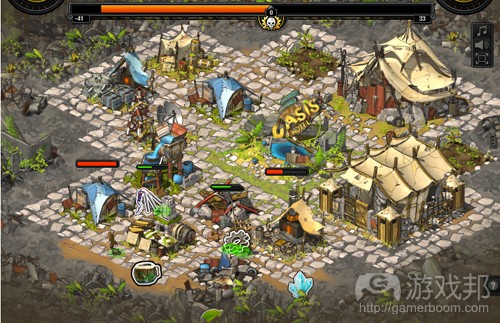每日观察:关注Crowdstar新作《Wasteland Empires》(10.22)
1)社交游戏开发商Crowdstar最近也开始发掘硬核游戏题材,推出Facebook策略战斗游戏《Wasteland Empires》,该游戏目前已进入公开测试阶段,据AppData数据显示,其MAU为15万,DAU达3万。
该游戏主要制作人Jonathan Cook表示,《Wasteland Empires》的灵感来自塔防类游戏,以及《魔兽争霸》和《星际争霸》等经典策略游戏。
玩家在游戏中要扮演一个小镇殖民地统治者的角色,所执行的操作不会受到能量系统的限制,只要有资源和时间就能完成组建军队和建设房屋等任务。如果派遣殖民者向自己的村庄之外扩展,玩家可以获得更多资源和土地,从而建设更多房屋、农场和水塔等。
游戏中的工人与军队人口比例为50:50,如果攻击了其他玩家或NPC角色的前哨站,就意味着玩家在指示自己的军队摧毁对方的建筑。
2)Google+游戏开发倡导者Todd Kerpelman在最近的媒体采访中表示,Google+Games之所以步履姗姗是因为该系统目前尚未准备就绪,他们希望一切就位后或再向所有开发者开放服务(游戏邦注:该平台目前仅与Zynga、PopCap和Kabam等数家大型开发商展开合作),以免Google+系统因同时向所有人开放门户而崩溃。
他称自己仍不清楚Google+将采用完全开放的策略,还是走类似于苹果的相对保守路线,这个平台刚问世几个月,仍然具有较大完善空间。
3)传媒大亨默多克在日前的年度股东大会上承认,MySpace是他犯下的一大过错,他们错误地运营这个网站,除了他自己,现在所有真正关心这个网站的人都已经离开公司。
MySpace已在今年6月份以3500万美元价格出售给Specific Media,比新闻集团收购该网站时的价格亏损了94%。
4)据gamasutra报道,前Capcom游戏开发者Keiji Inafune(游戏邦注:他最近成立了自己的工作室Comcept,正面向DeNA和GREE平台开发游戏)在最近的采访中表示,他在设计游戏时并不十分依赖反馈参数,他会快速查看并消化数据,然后根据自己的想法分析数据所指向的意义。他认为游戏开发者必须具有一种内在的分析能力,否则自己的游戏创意就只能被市场营销数据牵着走,而这类事情靠电脑就能完成了。
他称如果开发者严重依赖反馈参数,那么最后只会得到一堆意义不大的数据,了解某人喜欢的食物,并不等于了解他的个性。
除此之外,他还认为社交游戏预示着电子游戏的未来,这个行业最终会出现一种非掌机非社交的新游戏,它可解决这两种游戏风格之间的障碍,但他还只是刚涉水这个市场,所以并不能明确预言其具体发展方向。他称人们必须终止社交游戏领域的“模仿”和山寨现象,否则这一行业永远无法实现新突破。
5)在本周于麻省理工学院举办的新兴科技大会上,研究人员提供了相关证据指出,人们在与游戏互动的过程中可能运用了脑波。
瓦兹沃斯中心科学家Gerwin Schalk展示的视频内容显示,在玩id Software经典游戏《毁灭战士》过程中,玩家只是使用摇杆进行移动操作,真正发出开火指令的是其大脑中的想法。Schalk称这一幕并非科幻小说,而是活生生的现实。
据称Emotiv等公司也在多年前就提出了类似的概念,他们使用的是与参与调查者头皮相连接的EEG感应器等较不具干扰性的研究方法。
6)Ludia旗下游戏《Family Feud》在Facebook已有160万MAU,最近该公司又发布这款游戏的iOS版本《Family Feud & Friends》。
《Family Feud & Friends》是一款iPhone和iPad通用的免费游戏,两个版本都可连接到Facebook,支持玩家在移动设备上与Facebook好友进行互动。
玩家在游戏中可通过三轮异步玩法(游戏邦注:这意味着玩家可在不丢分和落下进程的情况下,随后再返回游戏),挑战陌生人以赢取高分。与电视问答节目一样,玩家需用同一个答案回应五个一组的问题,可通过涂鸦墙向好友求助,或者发送短信和电子邮件让他们施以援手。(本文为游戏邦/gamerboom.com编译,拒绝任何不保留版权的转载,如需转载请联系:游戏邦)
1)CrowdStar’s Wasteland Empires on Facebook: Both fresh and decayed
by Joe Osborne
Mel Gibson would be proud to discover that the spiritual, social tribute to Beyond Thunderdome has arrived on Facebook. (Well, after he stops talking to that infernal puppet.) CrowdStar has released its next big Facebook game for all to play: Wasteland Empires. Wait a tick … that doesn’t sound happy or girly at all. You’re absolutely right, imaginary dissenter–this real time strategy (RTS) social game marks marks the company’s interest in the supposedly burgeoning male audience.
According to lead producer Jonathan Cook, Wasteland Empires draws inspiration from the tower defense genre and classic strategy games like Warcraft and Starcraft. Simply put, CrowdStar is looking to emulate the hardcore strategy game experience, but without the massive amount of time that most strategy games demand. Not to mention in a setting that has admittedly been largely under-served on Facebook: Wasteland Empires takes place in the not-so-distant future, 58 years after the apocalypse.
“We picked the style because it’s something that we wanted to see, and hadn’t really seen anything else like that,” Cook tells us. “We don’t have as much time as we used to when we were in college, but to be able to build something that reminds us of games being fun, and bringing that to the Facebook environment, is just really exciting.”
Players assume the role of a leader of sorts over a growing shanty town of colonists that have just found their first pure source of water in years. Not governed by an energy system, actions in Wasteland Empires like expansion and creating new troops and buildings merely takes resources and time. As you send colonists to scavenge the outskirts of your village, you’ll acquire more resources and uncover more land to place buildings like houses, farms and water towers upon.
These motions will surely increase your population, which is split 50/50 between workers and attack units. There are multiple units to choose from like Scouts (small, fast units with speedy attacks), Clubbers (larger, beefier guys with slower attacks) and later on even gunners and troops piloting bipedal war machines. Attacking other players’ or NPC (non-player character) outposts on the map is simply a matter of directing your squad of units to destroy any defensive buildings first and clean up what’s left. (source:games)
2)Google: Games platform ‘is not ready to handle’ opening up to creators
by Joe Osborne
There’s a reason that Google+ Games has been a slow burn since its launch this summer: It can’t handle much more. Speaking exclusively with Gamasutra, Google+ game developer advocate Todd Kerpelman said, “And that is our larger goal, to bring in more developers, and eventually open it up to anybody that wants to develop on Google+. Just right now the system is not ready to handle that.”
Google has been quite exclusive with which developers it allows to bring their games onto Google+ Games, working with only the biggest names in casual and social games like Rovio, Zynga, PopCap and Kabam to name a few. (Well, there aren’t many more than that, really.) While this is partially due to the fact that Google+ would likely be crushed if the gates were opened to everyone at once, the company is still working out how exactly it wants to handle developers.
“I’m not sure what our plans are – to be completely open versus something like an Apple-style, curated business – that’s still to be determined, and we’re still working it out,” Kerpelman said to Gamasutra. “…The platform has only been out a couple of months, so we’ve got a way to go.”
Gamasutra notes that, if Google opted to open up Google+ Games like it has the Android Market–which is essentially a wild west of games and apps–it would almost certainly have to handle counterfeit games. And that’s something, according to Kerpelman, Google simply doesn’t want in its online marketplaces anymore. (Who else just screamed hallelujah?)
This news comes just as a Google engineer name-dropped the Google+ Games platform specifically in a rant, implying that the initiative was an afterthought for Google. We’re impressed by the platform’s pristine presentation (and we’re sure game makers love that tiny 5 percent price tag), but Kerpelman’s right: Google’s got a way to go, and updates like this are certainly steps.(source:games) http://blog.games.com/2011/10/21/google-games-not-ready-developers/
3)Murdoch On Myspace: “I Made A Huge Mistake.”
Devin Coldewey
Rupert Murdoch withstood intense grilling at News Corp’s annual shareholder meeting today, which focused largely on the phone-hacking scandal that is causing such an upset in the company’s financials and leadership. But among other things, Murdoch owned up to the debacle that has been Myspace.
“I made a huge mistake,” he said. “We then proceeded to mismanage it in every possible way. All of the people concerned with it are no longer with the company.” Except for himself, of course. The fact that it was a mistake and a mismanaged one at that is not news to the rest of the world, but the unmixed apology for the billion-dollar boondoggle reflects how low recent events have brought the once-proud news giant.
As you no doubt remember, the flatlining social network was sold in June to Specific Media for $35 million, representing a loss of around 94% of the site’s value as bought, and a microscopic portion of the never-realistic $6 billion at which Murdoch once valued the property.
Despite his self-deprecating words, Murdoch was described as looking “a little feisty” by the New York Times, perhaps because he is confident that the company has already shed the requisite amount of blood and profits over its practices and investments. The Hollywood Reporter has collected a number of opinions from analysts and experts, and the consensus seems to be that no immediate actions would be taken, but that clearly the company is in dire need of redirection, and the solution may take some time to formulate.(source:techcrunch)
4)Capcom veteran Inafune doesn’t rely on social game metrics ‘slavishly’
by Joe Osborne
Since his 23-year stint with Capcom abruptly ended nearly a year ago, Japanese game designer Keiji Inafune (pictured) is already at work making new games, namely social games. With two games in the works for both DeNA and Gree–J.J. Rockets and Island of Dr. Momo, respectively–Inafune looks to do things a little differently in the mobile social games space, according to a talk with Gamasutra.
“So I don’t rely on metrics slavishly; I give them quick looks, absorbing them and reflecting them against my own thoughts to analyze what they mean,” Inafune told Gamasutra.” Game creators have to be really good at that internal sort of analysis; otherwise you’re just looking toward marketing data for your game ideas, and a computer can do that.”
Inafune went on to say, “If you rely on those, then basically what you’ve got is a set of numbers that don’t necessarily tell you anything. Just because you know what someone’s favorite food doesn’t mean you really know the person.” Compelling, huh? The creator of storied franchises like Mega Man thinks social games might herald of the future of video games. Period.
“I think that eventually, we’re see a new kind of game which is neither console nor social, one that overcomes the obstacles that both current game styles have to deal with,” Inafune said to Gamasutra. “I don’t know what that’s going to be yet, though, so that’s why I’m trying to learn more about this market.”
The designer went on to say that the persistent “me-too” trend in social game creation needs to stop if we’re to see this happen. And Keiji, we couldn’t agree more. In pursuit of this fresh new form of social game, Inafune recently opened his own studio, Comcept. Now, how do we make such games profitable enough for more designers to bite?(source:games)
5)Study Sees Volunteers Playing Doom With Their Brains
by Frank Cifaldi
At this week’s Emerging Technology Conference at the Massachusetts Institute of Technology, researchers presented evidence suggesting that humans may interact with games using brain waves.
Researchers working with test subjects were able to tap into the human brain’s alpha waves and translate them into commands that communicate direction with computers.
In one particular demonstration, Wadsworth Center research scientist Gerwin Schalk presented video evidence of a test subject playing id’s classic Doom on a computer. The player used a joystick to move about, but used thought commands to fire the gun — with apparently accurate results.
“What I’m here to tell you is that this is not science fiction. This is an emerging reality,” Schalk said in his presentation.
The test subjects used in the study already had their brains wired up for treatment of illnesses such as epilepsy.
Companies such as Emotiv have been demonstrating variants on the concept for a number of years. These firms have worked using EEG sensors in the scalp, a much less invasive method.
Other Schalk-tested demonstrations, though not game-related, included a program that could tell the difference between a brain thinking the sounds “Ah” or “Ooh,” and one that was able to track the sound levels of music that a subject was listening to through brainwaves alone.(source:gamasutra)
6)Family Feud & Friends on iOS makes the Facebook game mobile
by Brandy Shaul
While Family Feud on Facebook draws in around 1.6 million monthly players, developer Ludia is hoping to expand upon that number (or, at the very least, please established fans) by releasing Family Feud & Friends on iOS. The game is free on both iPhone and iPad (via a universal app), and both versions connect to Facebook, allowing you to experience all of the fun from the Facebook version right in the palm of your hand (or your lap, in the case of the iPad).
For those unfamiliar with the Facebook version, it’s the same gameplay from the famous show, but streamlined. You’re given three rounds of survey questions, with the top answers being hidden. It’s your job to guess what a crowd of 100 average folks answered. Say you’re asked: “What might men think women waste too much money on?” You could then answer things like “Makeup” or “Clothing,” as those are things men might say stereotypically.
In this version of Family Feud, you’re allowed to challenge complete strangers to earn a high score across these three rounds of asynchronous gameplay (meaning that you can come back at a later time to finish games without losing progress or points). Whoever has the most points goes on to play Fast Money. Like in the TV Show, you’re allowed to answer a series of five questions with a single response, and can then post a request to your friends’ Facebook walls, or even send them text messages or emails through your device to have them come help you out.(source:games)













































 闽公网安备35020302001549号
闽公网安备35020302001549号